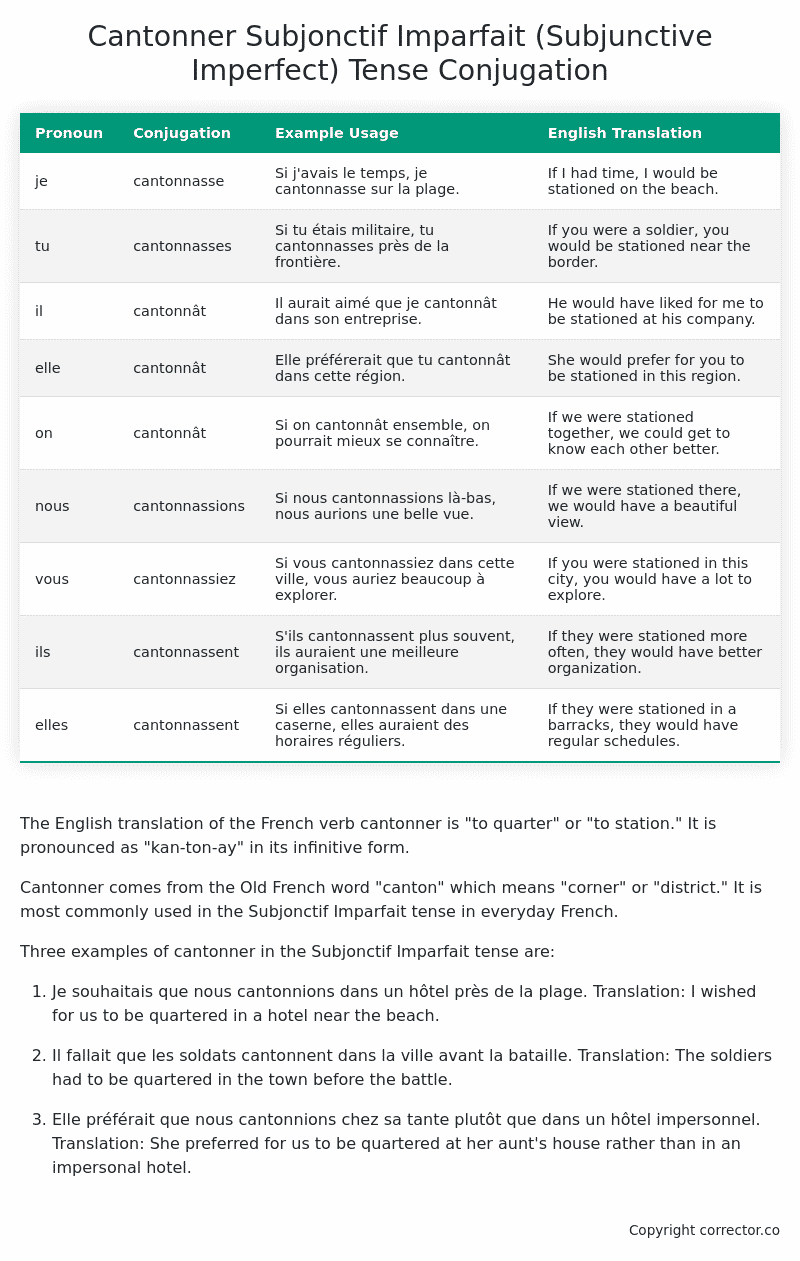Subjonctif Imparfait (Subjunctive Imperfect) Tense Conjugation of the French Verb cantonner
Introduction to the verb cantonner
The English translation of the French verb cantonner is “to quarter” or “to station.” It is pronounced as “kan-ton-ay” in its infinitive form.
Cantonner comes from the Old French word “canton” which means “corner” or “district.” It is most commonly used in the Subjonctif Imparfait tense in everyday French.
Three examples of cantonner in the Subjonctif Imparfait tense are:
-
Je souhaitais que nous cantonnions dans un hôtel près de la plage.
Translation: I wished for us to be quartered in a hotel near the beach. -
Il fallait que les soldats cantonnent dans la ville avant la bataille.
Translation: The soldiers had to be quartered in the town before the battle. -
Elle préférait que nous cantonnions chez sa tante plutôt que dans un hôtel impersonnel.
Translation: She preferred for us to be quartered at her aunt’s house rather than in an impersonal hotel.
Table of the Subjonctif Imparfait (Subjunctive Imperfect) Tense Conjugation of cantonner
| Pronoun | Conjugation | Example Usage | English Translation |
|---|---|---|---|
| je | cantonnasse | Si j’avais le temps, je cantonnasse sur la plage. | If I had time, I would be stationed on the beach. |
| tu | cantonnasses | Si tu étais militaire, tu cantonnasses près de la frontière. | If you were a soldier, you would be stationed near the border. |
| il | cantonnât | Il aurait aimé que je cantonnât dans son entreprise. | He would have liked for me to be stationed at his company. |
| elle | cantonnât | Elle préférerait que tu cantonnât dans cette région. | She would prefer for you to be stationed in this region. |
| on | cantonnât | Si on cantonnât ensemble, on pourrait mieux se connaître. | If we were stationed together, we could get to know each other better. |
| nous | cantonnassions | Si nous cantonnassions là-bas, nous aurions une belle vue. | If we were stationed there, we would have a beautiful view. |
| vous | cantonnassiez | Si vous cantonnassiez dans cette ville, vous auriez beaucoup à explorer. | If you were stationed in this city, you would have a lot to explore. |
| ils | cantonnassent | S’ils cantonnassent plus souvent, ils auraient une meilleure organisation. | If they were stationed more often, they would have better organization. |
| elles | cantonnassent | Si elles cantonnassent dans une caserne, elles auraient des horaires réguliers. | If they were stationed in a barracks, they would have regular schedules. |
Other Conjugations for Cantonner.
Le Present (Present Tense) Conjugation of the French Verb cantonner
Imparfait (Imperfect) Tense Conjugation of the French Verb cantonner
Passé Simple (Simple Past) Tense Conjugation of the French Verb cantonner
Passé Composé (Present Perfect) Tense Conjugation of the French Verb cantonner
Futur Simple (Simple Future) Tense Conjugation of the French Verb cantonner
Futur Proche (Near Future) Tense Conjugation of the French Verb cantonner
Plus-que-parfait (Pluperfect) Tense Conjugation of the French Verb cantonner
Passé Antérieur (Past Anterior) Tense Conjugation of the French Verb cantonner
Futur Antérieur (Future Anterior) Tense Conjugation of the French Verb cantonner
Subjonctif Présent (Subjunctive Present) Tense Conjugation of the French Verb cantonner
Subjonctif Passé (Subjunctive Past) Tense Conjugation of the French Verb cantonner
Subjonctif Imparfait (Subjunctive Imperfect) Tense Conjugation of the French Verb cantonner (this article)
Subjonctif Plus-que-parfait (Subjunctive Pluperfect) Tense Conjugation of the French Verb cantonner
Conditionnel Présent (Conditional Present) Tense Conjugation of the French Verb cantonner
Conditionnel Passé (Conditional Past) Tense Conjugation of the French Verb cantonner
L’impératif Présent (Imperative Present) Tense Conjugation of the French Verb cantonner
L’infinitif Présent (Infinitive Present) Tense Conjugation of the French Verb cantonner
Struggling with French verbs or the language in general? Why not use our free French Grammar Checker – no registration required!
Get a FREE Download Study Sheet of this Conjugation 🔥
Simply right click the image below, click “save image” and get your free reference for the cantonner Subjonctif Imparfait tense conjugation!

Cantonner – About the French Subjonctif Imparfait (Subjunctive Imperfect) Tense
Formation
Common Everyday Usage Patterns
Interactions with Other Tenses
Subjonctif Présent
Indicatif Passé Composé
Conditional
Conditional Perfect
Summary
I hope you enjoyed this article on the verb cantonner. Still in a learning mood? Check out another TOTALLY random French verb conjugation!


